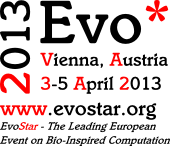Application of Nature-inspired Techniques for Communication Networks and other Parallel and Distributed Systems featuring a fast-track option for Applied Soft Computing Journal
This year’s edition is technically sponsored by the World Federation on Soft Computing.

Network systems are all those structures based either on a physical network organization and/or on an abstract (human-centred) network model. They show a growing structural and computational complexity and are made of a large number of highly dynamic and heterogeneous components.
Examples of such structures are communication systems, networks, wireless networks, and abstractly-connected systems. These latter represent all the situations in which multiple entities interact and are interconnected by a logical network, and their collective behaviour determines a dynamic system in fields such as transportation, logistics, finance, economics, social networks, and many others.
The aim of the event is to provide a forum to present the cutting edge research on Nature-inspired approaches to problems arising in the design, control, protection, and management of network systems, and to outline new trends in parallel nature-inspired computation for the efficient solution of complex problems.
In recent years humans are taking advantage of the fact that Nature has provided basic inspiration for the definition of a number of novel computational intelligence approaches. These approaches are proving themselves able to deal effectively with, among others, the challenges of current network systems. Among them, evolutionary algorithms are of high relevance for EvoCOMNET.
All papers dealing with the application of evolutionary computation approaches to network systems are well suited to the workshop
Areas of Interest and Contributions
- EvoCOMNET 2013 solicits contributions dealing with the application of ideas from natural processes and systems to the definition, analysis, and development of novel sequential, parallel, and distributed evolutionary computation approaches to the solution of problems of practical and theoretical interest in all domains related to network systems. Use and tuning of hybrid computational approaches based on evolutionary techniques are also welcome.
The scope of the event emphasizes contributions to the following application domains, but is not limited to:
- Communication systems:
- Telecommunication, mobile, satellite, voice, and optical communications
- Distributed inference and cooperative communication systems
- Network analysis and design
- Switching and Routing
- Networks:
- Sensor networks
- Mobile ad hoc networks
- Peer-to-peer networks
- Distributed search and computing in peer-to-peer networks
- Network protection systems
- Network robotics and sensor-actor networks
- Network-related issues:
- Parallel and distributed optimization algorithms
- Grid and cloud computing
- Load balancing, routing, scheduling, and mapping in network-based computing systems
- Quality-of-service provisioning
- Distributed data mining
- Abstract network systems:
- Transportation
- Supply
- Logistics
- Traffic management and simulation
- Social network systems
- Financial and economic network systems
- Real-world implementations
- Studies based on real-world data sets
- Live demonstrations of algorithm behaviour
Publication Details
Accepted papers will appear in the proceedings of EvoStar, published in a volume of the Springer Lecture Notes in Computer Science, which will be available at the Conference.
Furthermore, a selection of the best accepted papers, suitably revised and extended, will be eligible for fast-track publication in Applied Soft Computing journal by Elsevier (Impact Factor 2.612), thanks to the technical sponsorship offered by the World Federation on Soft Computing.
Submission Details
Submissions must be original and not published elsewhere. They will be peer reviewed by members of the program committee. The reviewing process will be double-blind, so please omit information about the authors in the submitted paper.
Submit your manuscript in Springer LNCS format.
Page limit: 10 pages to http://myreview.csregistry.org/evoapps13/.
Submission deadline: 1 November 2012 Extended to 11 November 2012
EvoCOMNET track chairs
- Antonio Della Cioppa
University of Salerno, Italy
adellacioppa(at)unisa.it
- Ivanoe De Falco
ICAR/CNR, Italy
ivanoe.defalco(at)na.icar.cnr.it
- Ernesto Tarantino
Institute for high performance computing and networking, Italy
ernesto.tarantino(at)na.icar.cnr.it
Program Committee
- Baris Atakan, Koc University, Turkey
- Mehmet E. Aydin, University of Bedfordshire, UK
- Alexandre Caminada, University of Technology Belfort-Montbéliard, France
- Iacopo Carreras, CREATE-NET, Italy
- Gianni Di Caro, IDSIA, Switzerland
- Muddassar Farooq, FAST National University of Computer and Emerging Technologies, Pakistan
- Bryant Julstrom, St. Cloud State University, USA
- Farrukh A. Khan, National University of Computer & Emerging Sciences, Pakistan
- Kenji Leibnitz, Osaka University, Japan
- Domenico Maisto, ICAR-CNR, Italy
- Roberto Montemanni, IDSIA, Switzerland
- Enrico Natalizio, INRIA Lille, France
- Conor Ryan, University of Limerick, Ireland
- Chien-Chung Shen, University of Delaware, USA
- Lidia Yamamoto, University of Strasbourg, France
- Nur Zincir-Heywood, Dalhousie University, Canada






